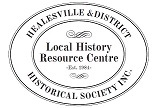By Frank Endacott
The two different ways the name Riddell may be pronounced puzzle most people. It has become a conversational nuisance and a toponymyological conundrum, or a real proper muck-up.
There should be an effort made to find the right and wrong ways of saying the name, and if the case is either or neither, and the mountain still there, we can walk up and take our pick, and let future generations ponder the nomenclature for themselves.
Mount Riddell was named after John Carre Riddell (1809-1879), a member of an ancient Scottish family who pronounced their name Riddle, just as their Australian descendants do. No doubt this pronunciation is the reason Mount Riddell has been spoken that way since early days. The other method, to make Riddell rhyme with well, seems to have come from English usage.
John Carre Ridelle had no known connection with Healesville, but it is believed that the mountain was named after him by his friend, Lieutenant-Governor La Trobe. The name appears on very early survey maps.
Riddell became elected to early Victorian parliaments and supported many import social reforms that today are taken for granted. His second son, Walter, was chairman of the Melbourne & Metropolitan Board of Works for twenty-two years early in this century. Walter’s name appears on the bronze plaque on the end of Maroondah Dam wall, showing that he had been chairman during the building of the dam from 1920 to 1927.
With all the fuss about pronunciation, Mount Riddell’s history has not been mentioned, nor its interesting Aboriginal lore and legend. The wonderful beauty of the southern slopes, and the deep affection Healesville people have for their delectable mountain, should all be put into words. But as Kipling would say, “That’s another story.”
Frank Endacott has been long known as a local historian with an extensive collection of Healesville and Australian material, and an as yet unrecorded store of knowledge to match. Pam Firth’s contribution on page 4 recounts an experience familiar to many people who have sought to add their knowledge of Healesville history: “Queries . . . soon led us to meet Frank Endacott.” Many students, researchers, or people just casually interested in some local item have had reason to be grateful for Frank’s continuing interesting and his willingness to share with genuine enquiries.
What is all knowledge too but recorded experience, and a product of history; of which, therefore, reasoning and belief, no less than action and passion, are essential materials?
Thomas Carlyle.
